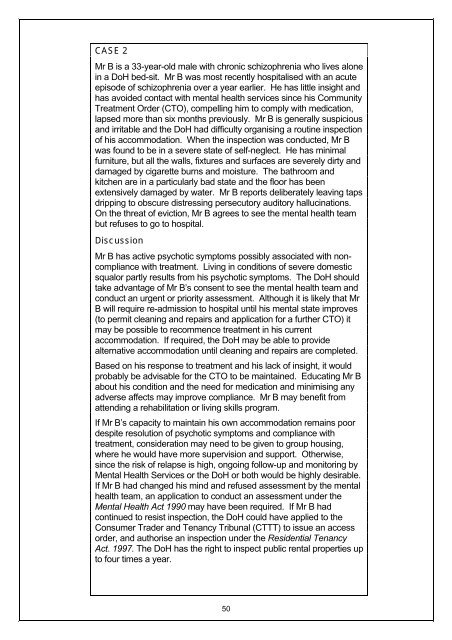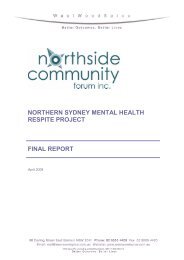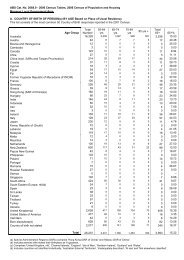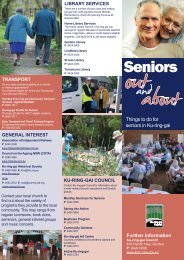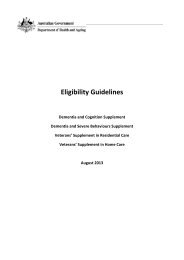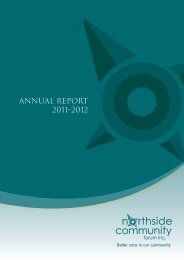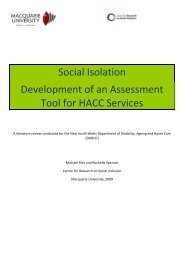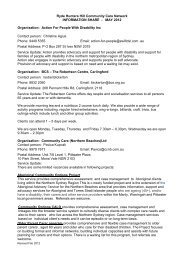Guidelines for field staff to assist people living in ... - Housing NSW
Guidelines for field staff to assist people living in ... - Housing NSW
Guidelines for field staff to assist people living in ... - Housing NSW
You also want an ePaper? Increase the reach of your titles
YUMPU automatically turns print PDFs into web optimized ePapers that Google loves.
CASE 2Mr B is a 33-year-old male with chronic schizophrenia who lives alone<strong>in</strong> a DoH bed-sit. Mr B was most recently hospitalised with an acuteepisode of schizophrenia over a year earlier. He has little <strong>in</strong>sight andhas avoided contact with mental health services s<strong>in</strong>ce his CommunityTreatment Order (CTO), compell<strong>in</strong>g him <strong>to</strong> comply with medication,lapsed more than six months previously. Mr B is generally suspiciousand irritable and the DoH had difficulty organis<strong>in</strong>g a rout<strong>in</strong>e <strong>in</strong>spectionof his accommodation. When the <strong>in</strong>spection was conducted, Mr Bwas found <strong>to</strong> be <strong>in</strong> a severe state of self-neglect. He has m<strong>in</strong>imalfurniture, but all the walls, fixtures and surfaces are severely dirty anddamaged by cigarette burns and moisture. The bathroom andkitchen are <strong>in</strong> a particularly bad state and the floor has beenextensively damaged by water. Mr B reports deliberately leav<strong>in</strong>g tapsdripp<strong>in</strong>g <strong>to</strong> obscure distress<strong>in</strong>g persecu<strong>to</strong>ry audi<strong>to</strong>ry halluc<strong>in</strong>ations.On the threat of eviction, Mr B agrees <strong>to</strong> see the mental health teambut refuses <strong>to</strong> go <strong>to</strong> hospital.DiscussionMr B has active psychotic symp<strong>to</strong>ms possibly associated with noncompliancewith treatment. Liv<strong>in</strong>g <strong>in</strong> conditions of severe domesticsqualor partly results from his psychotic symp<strong>to</strong>ms. The DoH shouldtake advantage of Mr B’s consent <strong>to</strong> see the mental health team andconduct an urgent or priority assessment. Although it is likely that MrB will require re-admission <strong>to</strong> hospital until his mental state improves(<strong>to</strong> permit clean<strong>in</strong>g and repairs and application <strong>for</strong> a further CTO) itmay be possible <strong>to</strong> recommence treatment <strong>in</strong> his currentaccommodation. If required, the DoH may be able <strong>to</strong> providealternative accommodation until clean<strong>in</strong>g and repairs are completed.Based on his response <strong>to</strong> treatment and his lack of <strong>in</strong>sight, it wouldprobably be advisable <strong>for</strong> the CTO <strong>to</strong> be ma<strong>in</strong>ta<strong>in</strong>ed. Educat<strong>in</strong>g Mr Babout his condition and the need <strong>for</strong> medication and m<strong>in</strong>imis<strong>in</strong>g anyadverse affects may improve compliance. Mr B may benefit fromattend<strong>in</strong>g a rehabilitation or <strong>liv<strong>in</strong>g</strong> skills program.If Mr B’s capacity <strong>to</strong> ma<strong>in</strong>ta<strong>in</strong> his own accommodation rema<strong>in</strong>s poordespite resolution of psychotic symp<strong>to</strong>ms and compliance withtreatment, consideration may need <strong>to</strong> be given <strong>to</strong> group hous<strong>in</strong>g,where he would have more supervision and support. Otherwise,s<strong>in</strong>ce the risk of relapse is high, ongo<strong>in</strong>g follow-up and moni<strong>to</strong>r<strong>in</strong>g byMental Health Services or the DoH or both would be highly desirable.If Mr B had changed his m<strong>in</strong>d and refused assessment by the mentalhealth team, an application <strong>to</strong> conduct an assessment under theMental Health Act 1990 may have been required. If Mr B hadcont<strong>in</strong>ued <strong>to</strong> resist <strong>in</strong>spection, the DoH could have applied <strong>to</strong> theConsumer Trader and Tenancy Tribunal (CTTT) <strong>to</strong> issue an accessorder, and authorise an <strong>in</strong>spection under the Residential TenancyAct. 1997. The DoH has the right <strong>to</strong> <strong>in</strong>spect public rental properties up<strong>to</strong> four times a year.50


